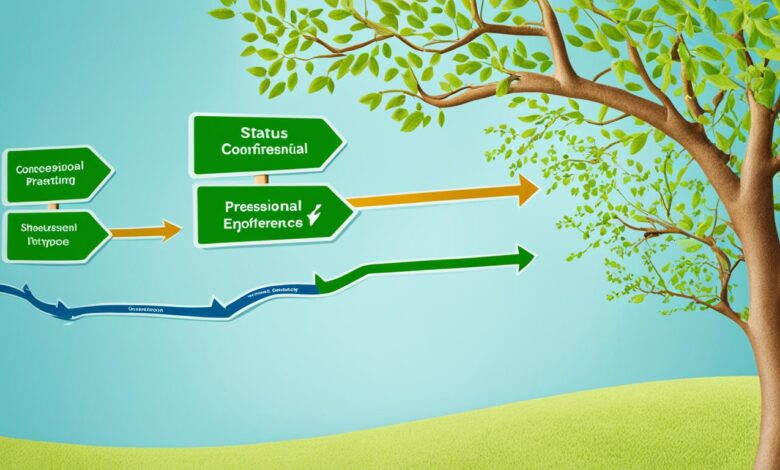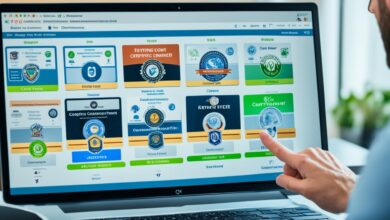Career Development Examples to Inspire Growth

Are you looking to take your career to new heights? Do you crave professional advancement and job progression? It’s time to explore the exciting world of career development opportunities and unleash your full potential. But where do you begin? How can you strategize your career growth to achieve success?
In this article, we will provide you with a diverse range of career development examples that will inspire your own journey towards growth and success. Whether you are seeking skills growth, looking for professional advancement opportunities, or searching for training pathways to enhance your capabilities, we have got you covered. Get ready to discover the keys to unlocking your career potential!
Key Takeaways:
- Setting professional development goals is crucial for staying up-to-date, increasing engagement, and aligning with career aspirations.
- Following the SMART framework (specific, measurable, achievable, relevant, time-bound) can help you set effective professional development goals.
- Skills development, leadership development, and personal development goals are three main types of career development goals.
- Examples of skills development goals include enhancing technical proficiency and communication skills.
- Leadership development goals focus on nurturing leadership skills such as strategic thinking and conflict resolution.
- Personal development goals encompass holistic growth, including self-confidence boost and health and wellness.
- Career development opportunities bring benefits like discovering new interests, providing new challenges, and increasing confidence and credibility.
Why Set Professional Development Goals?
Setting professional development goals can have numerous benefits for individuals seeking to grow in their careers. By establishing clear goals, professionals can stay up-to-date on industry trends and advancements, ensuring they remain competitive and adaptable in rapidly evolving work environments.
Moreover, setting goals enhances engagement and job satisfaction by providing a sense of progress and continual learning. When individuals have a target to strive for and a roadmap to follow, they feel more motivated and fulfilled in their roles. This, in turn, contributes to increased productivity and a stronger sense of fulfillment.
Another significant advantage of establishing professional development goals is the alignment with one’s career aspirations. By setting goals that align with their desired career trajectory, professionals can ensure that their actions and efforts are directed towards their long-term objectives. This alignment creates a clear path for growth and development and serves as a guiding force in their professional journey.
Overall, the benefits of professional development goals are multi-faceted. They enable individuals to stay abreast of industry trends, enhance engagement and job satisfaction, and align their actions with their career aspirations. By setting and pursuing meaningful goals, professionals can unlock their full potential, drive their success, and thrive in their chosen fields.
How to Set Professional Development Goals
Setting professional development goals is an essential step in advancing your career and achieving long-term success. By defining clear objectives, you can focus your efforts and make consistent progress towards your professional aspirations. To ensure your goals are effective and impactful, it’s beneficial to follow the SMART framework.
What are SMART Goals?
The SMART acronym stands for Specific, Measurable, Achievable, Relevant, and Time-bound. Applying these principles to your professional development goals will enhance their effectiveness and increase your chances of success.
“By setting SMART goals, individuals can clarify what they need to achieve in the short-term to reach their long-term career goals.”
Specific
To begin, your goals should be specific and well-defined. Clearly articulate what you want to accomplish, ensuring that there is no ambiguity or confusion. Instead of setting a vague goal like “improve communication skills,” make it more specific, such as “attend a communication skills workshop to enhance verbal and written communication abilities.”
Measurable
It is crucial to establish measurable criteria for tracking progress towards your goals. By setting measurable objectives, you can monitor your advancement and adjust your efforts accordingly. For example, consider stating a target like “increase sales revenue by 10% within the next quarter” rather than a general goal like “increase sales.”
Achievable
Your goals should be achievable and within reach. Consider your current abilities, resources, and constraints when setting your goals. It’s important to challenge yourself but also ensure that your objectives are realistic. Setting unattainable goals can lead to demotivation and hinder your progress.
Relevant
Align your professional development goals with your larger career aspirations and the needs of your current role or industry. Ensure that your goals are relevant to your skill set and will contribute to your overall growth and success. For instance, if you aspire to become a project manager, setting a goal to develop project management skills would be highly relevant.
Time-bound
Establishing a specific timeframe for achieving your goals provides structure and motivation. Set deadlines or target dates for each goal to create a sense of urgency and maintain momentum. For example, instead of saying “improve technical proficiency,” set a deadline such as “achieve technical certification within six months.”
By following the SMART framework, you can create professional development goals that are well-defined, measurable, achievable, relevant, and time-bound. This approach will help you stay focused, track your progress, and foster continuous growth in your career. Remember to regularly review and update your goals as necessary to adapt to changing circumstances and maintain relevance.
Examples of Skills Development Goals
In today’s rapidly changing work environment, constantly updating and improving job-related skills is crucial for professional growth and success. Skills development goals help individuals enhance their technical proficiency, communication skills, project management mastery, time management abilities, and problem-solving skills. By setting clear goals and actively working towards them, professionals can stay competitive and adapt to the evolving demands of their roles and industries.
Here are some examples of skills development goals that professionals can consider:
- Improving Technical Proficiency: Setting a goal to master specific software or tools relevant to your field can enhance your technical expertise, making you more efficient and effective in your job.
- Enhancing Communication Skills: Focusing on both written and verbal communication can help you convey ideas clearly, collaborate effectively with colleagues and clients, and build strong professional relationships.
- Mastering Project Management Methodologies: Developing a deep understanding of project management frameworks, methodologies, and best practices can improve your ability to organize and execute projects successfully within given constraints.
- Improving Time Management: Setting goals to improve time management skills can boost productivity, reduce stress, and ensure timely completion of tasks and projects.
- Developing Problem-Solving Skills: Cultivating problem-solving skills, such as critical thinking, analytical reasoning, and creativity, equips you with the ability to find innovative solutions to challenges that arise in your work.
By striving to achieve these skills development goals, professionals can not only enhance their individual performance but also contribute to the overall success of their teams and organizations. Remember to align these goals with your career aspirations and continuously evaluate your progress to ensure ongoing improvement.
Quote:
“Skills development goals help individuals enhance their technical proficiency, communication skills, project management mastery, time management abilities, and problem-solving skills.”
Examples of Leadership Development Goals
Leadership development goals play a crucial role in nurturing the skills and character traits necessary for effective leadership. By setting and pursuing these goals, individuals can enhance their abilities to lead and inspire others, ultimately driving success within their teams and organizations. Here are some examples of leadership development goals:
- Mentorship and Coaching: One key goal is to become a mentor or coach to others. By sharing knowledge and experiences, leaders can empower their team members to reach their full potential and contribute to the organization’s growth.
- Strategic Thinking: Developing strategic thinking abilities is essential for leaders to make informed decisions, set meaningful goals, and devise effective strategies that align with the organization’s vision and objectives.
- Conflict Resolution: Effective leaders are adept at resolving conflicts and fostering positive relationships among team members. Building skills in conflict resolution enables leaders to handle disagreements with diplomacy and find mutually beneficial solutions.
- Team Building: Building high-performing teams is a critical leadership goal. Leaders focus on creating a harmonious and collaborative environment, where team members feel valued, motivated, and empowered to achieve shared goals.
- Change Management: Developing change management skills is vital as leaders navigate organizational change. Leaders who can effectively communicate, motivate, and guide their team through transitions can minimize resistance and ensure smooth transformations.
By setting these leadership development goals and working towards them, individuals can strengthen their leadership capabilities and make a positive impact in their professional endeavors.
Examples of Personal Development Goals
Personal development goals are essential for achieving holistic growth, both personally and professionally. By focusing on self-improvement, individuals can enhance their well-being, skills, and relationships. Here are some examples of personal development goals to inspire individuals in their journey towards self-growth:
- Boost Self-Confidence: Developing self-confidence is crucial for succeeding in various aspects of life. Setting a goal to boost self-confidence can involve activities such as taking public speaking courses, practicing positive affirmations, or challenging oneself to step out of the comfort zone.
- Improve Stress Management Skills: Stress management is vital for maintaining a healthy work-life balance. Setting a goal to improve stress management skills can include practicing mindfulness and meditation, establishing healthy boundaries, or seeking professional support if needed.
- Strengthen Networking and Relationship-Building Skills: Building a strong professional network and nurturing relationships are essential for career advancement. A personal development goal in this area can involve attending networking events, joining professional organizations, or actively seeking opportunities to connect with colleagues or industry experts.
- Commit to Lifelong Learning: Emphasizing continuous learning is key to staying relevant and evolving in today’s dynamic world. Setting a personal development goal to commit to lifelong learning can involve enrolling in online courses, attending workshops or conferences, or dedicating regular time to reading and self-study.
- Prioritize Health and Wellness: Taking care of one’s physical and mental well-being is crucial for overall happiness and productivity. Setting a goal to prioritize health and wellness can include incorporating regular exercise routines, practicing self-care activities, maintaining a balanced diet, or seeking support from health professionals when needed.
Remember, personal development is a continuous journey, and it’s important to set realistic and actionable goals. By working towards these personal development goals, individuals can cultivate self-improvement, enhance their quality of life, and unlock their full potential.
“Investing in yourself is the best investment you will ever make. It will not only improve your life, but it will also improve the lives of those around you.”
Benefits of Career Development Opportunities
Career development opportunities provide individuals and organizations with a multitude of benefits. These opportunities not only enhance professional growth but also contribute to personal satisfaction and overall success. Let’s explore some of the key benefits:
- Discovering New Areas of Interest: Engaging in career development opportunities allows individuals to explore and discover new areas of interest within their field. By expanding their knowledge and skills, individuals can uncover hidden passions and pursue new career paths.
- Providing New Challenges: Career development opportunities present individuals with new challenges to overcome. These challenges help stimulate growth, creativity, and problem-solving abilities. They push individuals beyond their comfort zones and encourage continuous improvement.
- Keeping Motivated: Participating in career development opportunities provides individuals with a sense of purpose and motivation. Learning new skills, gaining new knowledge, and achieving goals keeps individuals engaged and focused on their professional journey.
- Impacting Job Search: Engaging in career development activities, such as training programs and workshops, expands networks and builds valuable connections. This, in turn, can positively impact job searches by providing individuals with increased visibility and access to new opportunities.
- Increasing Confidence and Credibility: Career development opportunities contribute to increased self-confidence and credibility. As individuals acquire new skills and knowledge, they gain a sense of accomplishment and competence, which translates into enhanced confidence in their abilities.
Continuous learning and growth through career development opportunities can truly transform an individual’s professional trajectory. By engaging in these opportunities, individuals open themselves up to new possibilities, sharpen their skills, and unlock their full potential.
Ultimately, career development opportunities are crucial for staying competitive in today’s dynamic work environment. They provide individuals with the tools and resources needed to adapt to evolving industry trends and advancements. By embracing these opportunities, professionals can propel their careers forward, achieve their goals, and contribute meaningfully to their organizations.
For more information about career development opportunities, visit https://www.opm.gov/policy-data-oversight/training-and-development/career-development/.
| Benefits of Career Development Opportunities |
|---|
| Discovering New Areas of Interest |
| Providing New Challenges |
| Keeping Motivated |
| Impacting Job Search |
| Increasing Confidence and Credibility |
Types of Development Goals
Development goals play a crucial role in personal and professional growth, providing individuals with a roadmap to success. These goals can be categorized into three main types: skills development goals, leadership development goals, and personal development goals.
1. Skills Development Goals
Skills development goals focus on acquiring and improving job-specific skills that are essential for career advancement and staying competitive in the workplace. These goals are centered around enhancing technical proficiency, communication skills, project management mastery, time management, and problem-solving abilities.
By setting skills development goals, individuals can equip themselves with the necessary expertise to excel in their current roles and open doors to new opportunities.
2. Leadership Development Goals
Leadership development goals are designed to nurture the skills and qualities necessary for effective leadership. Successful leaders not only inspire and guide their teams but also have a strategic vision for their organizations.
Some examples of leadership development goals include becoming a mentor or coach, developing strategic thinking abilities, enhancing conflict resolution skills, building high-performing teams, and mastering change management.
3. Personal Development Goals
Personal development goals focus on holistic growth within and outside the workplace. These goals are aimed at improving various aspects of an individual’s life, including emotional well-being, relationships, and overall wellness.
Examples of personal development goals include boosting self-confidence, improving stress management skills, strengthening networking and relationship-building abilities, committing to lifelong learning, and prioritizing health and wellness.
By setting personal development goals, individuals can improve their overall well-being and achieve a healthy work-life balance.
It is important to note that these three types of development goals are interconnected and contribute to a well-rounded and successful professional journey. By combining skills development, leadership development, and personal development goals, individuals can navigate their careers with confidence and purpose.
Conclusion
Setting and pursuing career development goals is crucial for professional growth and workplace success. By identifying and pursuing the right development goals, individuals can enhance their skills, knowledge, and capabilities. This, in turn, leads to improved job performance, increased job satisfaction, and opens up new opportunities for career advancement.
Throughout this article, we have provided various career development examples that can inspire individuals to create their own development goals. Whether it is focusing on skills development, leadership development, or personal growth, the key is to have a clear vision of where you want to go and take actionable steps to get there.
By committing to career development and following through on your goals, you can make significant progress in your professional journey. Remember, career development is a continuous process that requires dedication and perseverance. It is a journey of growth, learning, and unlocking your full potential. Embrace it, and watch your professional trajectory soar as you achieve workplace success.







